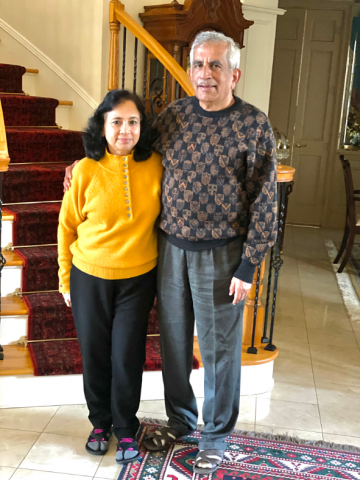BACKGROUND
Dr. Jay Raman was born in India and worked as a doctor in the Indian Army in New Delhi. He soon realized that the army life was not fit for him, and left for New York. Dr. Raman did his general surgery residency at the University of Rochester. In 1980, he moved to Houston to train under Dr. Cooley at the Texas Heart Institute in CV surgery. He started a private practice (North West Houston Surgical Associates) in September 1981. He has been practicing for nearly 40 years.
TRANSCRIPT
Where were you living before you came to the US?
I was living in Delhi, India.
And what caused you to migrate from India to the US?
It was mainly, for better professional development. That's the main reason. But you know there are other reasons also, after our marriage, we were not together for a long time because of my posting in the Indian Army mainly in the field area. So we had professional and family reasons.
How old were you when you came to the US?
I was born in 1945 and I came here in 1975. I came here. So you know, I was about… 30 years old.
Where did you arrive in America?
My wife and I landed in New York City but soon moved to Rochester. And I did my general surgery residency at the University of Rochester, which is upstate New York.
And what are your memories of your first days in the US?
The first thing I noticed, in New York, was the enormous number of cars on the road! I think in one day I saw more cars than I've seen in my life till that date, that is the one I first noticed. And the standard of the hospitals, of course, was of a different caliber and much higher [than those in India].
What was the best and what was the hardest thing about being an immigrant to the US?
Well, the best thing is that I was lucky that I got a job very soon and I didn't have to waste time. The worst thing is the separation from your family…parents. I couldn't be with my parents as much as I wanted to be. That was, I would say, is the most difficult factor.
What was the biggest difference coming to the US from India?
There is a lot more discipline and organization. Things are more organized and efficient.
What was the hardest part about adapting to the new culture?
I really didn't have too much problem adapting because, I had a lot of professional colleagues who were very good and helpful to me. So, you know, it was not like I was thrown into this new place. We had very few Indians in USA at that time. Naturally I had to mix with people with different ethnic origins. It was not difficult especially because of my profession.
How do you think that migration has changed you as a person?
My life changed. Scope for professional development was much higher here. If you work hard in this country, the rewards are much better than what you get in India.
Who was your source of strength during tough times?
My family was always there for me. My wife was the main strength. And I'm an old soldier. So, I have already faced a lot of difficult situations and the process of migration was not that hard. Some problems were there, but I really didn't have any serious challenges.
What advice would you give somebody who's coming to the US today?
Make your decision carefully because things have changed. When I came here, doctors were welcomed with open arms; not anymore. Getting into this country is pretty tough. And after choosing your course of action, go from there with determination. Don't expect that you will come here and straightaway, things will all turn out well. But if you persist in your efforts, you will succeed. Of course I can only speak for myself.
What is your definition of being American?
All Americans are immigrants. We should take the good things in America and also keep the good aspects of our culture. American values like discipline, honesty and professional integrity and our cultural values like family and religion. Have a happy combination of both, the best of both worlds!
How has America impacted your life?
I have lived here for 45 years and do not regret my decision at all. This country has had a wonderful and positive impact on my life!

